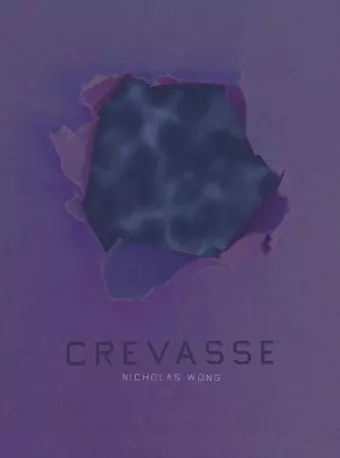
Crevasse, Hong Kong–based writer Nicholas Wong's newest collection of poetry, which won the 2016 Lamda Literary Award, starts with an epigraph from Maurice Merleau-Ponty that notes the impossibility of observing one's own physical body and, therefore, the necessity of a "second," "unobservable" body from which to view one's own. The poems in Crevasse seek to uncover the thread connecting these mutually observed and observing bodies. Like Samuel Beckett and others before him, Wong has deliberately chosen to write in a non-native language—English, his second language after Cantonese. Freed from the assumptions and conventions of his mother tongue, Wong strips down, interrogates and ultimately reorients the fragmented complexities of the multiple communities he inhabits—queer, Asian, poet, reader, lover—in a collection of poems that exposes the gap between familiarity and the inevitable distance of the body.
I imagine pronouncing Nicholas Wong’s new book “cruh-VASS,” with the emphasis on the second syllable. That seems more poetic to me. However, Wong doesn’t really need my help; Crevasse is leaking poetry. An exploration of bodies, cities, and the rifts within them, Crevasse looks at the tiny cracks that break along the borders of public and private selves. Take a look at the opening lines of the opening poem, “Private Parts: Anti-Bodies,” and you’ll see what I mean -- Dean Rader * Kenyon Review *
After reading Crevasse, I reread my review of Wong's debut collection, Cities of Sameness. I wrote that his poems were like statues of Greek gods, sculpted without a spare ounce of fat, and I stand by this observation. Wong's works combine free verse with rigorously carved stanzas, often in couplets and triplets, meticulously versed. This, however, does not mean there has been no development in Wong's poetics. While Cities exhibited experimentation with poetic forms, Crevasse shows more preference for certain forms and motifs. There are three poems named "Private Parts," three named "Self-Portraits" and three structured as one-line stanzas, each starting with a Ginsbergian fixed base (such as "how" or "if"). Wong's diction is as precise as ever, although in Crevasse he often uses somewhat dated vocabulary to add layers of meanings to his language. Not only are the poems top-notch, but even the book's design is so impeccable - the cover, colour scheme, typeface and editing all seem right - that it is like holding a work of art, an elaborate manifestation of aesthetics. -- Michael Tsang * Cha: An Asian Literary Journal *
. . . Experimenting with a mixture of humor and pathos, the conceptual and the conversational, Wong circles solitude, the emotion perhaps best understood through invocations of absence.There is the impression a body leaves behind on a bed, a dramatic gap or hole in our lives, a hole through which we fall. Not only does Crevasse beg to be read, and read aloud, and read repeatedly, but as it embodies disturbance, desire, love, and loss, Crevasse demands to be inhabited: the gap closes, if only for as long as the book remains open, solid in your hands. -- Liz Meley * Asian American Literary Review *
Crevasse is a gathering of poems that startle in the insistent way they play with memory, history, form, and the expectations we as readers bring to poems. These lines are invested in sentiment as well as intellect. Readers are invited to both feel and think in ways that create a dis-ease, in ways that push against expectations, in ways that challenge comfort. Wong writes in a seemingly causal, confessional, even glib voice about experiences and memories that discomfit us. The assistant poetry editor for Drunken Boat, Wong writes of bodies and antibodies, of Hong Kong and the Queen of England, of sexual awakenings, of race, of desire, of what we might see and know through the body, of politics as well as the erotic, of mourning and loss. -- Maggie Trapp * Los Angeles Review of Books *
ISBN: 9781885030207
Dimensions: unknown
Weight: unknown
80 pages